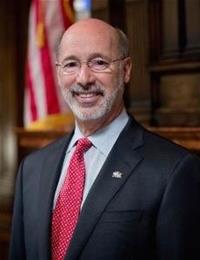Subscribe for Weekly Updates

Wolf Presents Pennsylvania Spending Plan to Some Praise
By Peter N. Calcara, vice president – government relations
On Feb. 5, 2019, Pennsylvania Gov. Tom Wolf presented his fifth state budget to a joint session of the Pennsylvania General Assembly. Wolf’s 2019-2020 fiscal year budget proposes $34.1 billion in spending, an increase of $927 million, or 2.79 percent, over the current year’s budget. The plan invests in workforce and education initiatives, increases opportunities for the state’s agriculture industry, and supports individuals and families most in need.
 “Today, I present a comprehensive plan to help grow our economy by continuing to invest in our workforce,” Wolf said. “This plan calls on contributions from the business community, labor unions, educators, research institutions, students, parents, and adult workers. And it increases opportunity for every Pennsylvanian at every stage of life – from birth to retirement.”
“Today, I present a comprehensive plan to help grow our economy by continuing to invest in our workforce,” Wolf said. “This plan calls on contributions from the business community, labor unions, educators, research institutions, students, parents, and adult workers. And it increases opportunity for every Pennsylvanian at every stage of life – from birth to retirement.”
Once again, a cornerstone of Wolf’s budget is an increase in funding for basic and special education and an expansion of access to early childhood education. Wolf’s plan calls for a $200 million increase in basic education funding and a $50 million increase for special education. The governor’s budget also proposes to increase the minimum starting salary for teachers to $45,000 per year to better align with competitive salaries and the increasing cost of living.
A new initiative in the governor’s plan is the creation of the Keystone Economic Development and Workforce Command Center. This program will bring together agency heads and public and private sector experts. It is a unique approach to finding solutions to today’s workforce issues, such as connecting skilled workers with jobs that need to be filled today and in the future.
The proposal calls for no new broad-based taxes, but it does include a plan to lower the state’s corporate net income tax rate by implementing combined reporting, a method of apportioning the income of corporations among the states in which they do business. Below shows the reduction in corporate tax rates to come over the next several years:
- Jan. 1, 2020, to Dec. 31, 2020: 8.99 percent
- Jan. 1, 2021, to Dec. 31, 2021: 8.29 percent
- Jan. 1, 2022, to Dec. 31, 2022: 7.49 percent
- Jan. 1, 2023, to Dec. 31, 2023: 6.99 percent
- Jan. 1, 2024, and thereafter: 5.99 percent
Republican lawmakers were generally positive about Wolf’s budget in their post-presentation comments.
“We welcome the governor’s support for improving Pennsylvania’s workforce development platform and share in the desire to attract and grow businesses that provide high-paying, family-sustaining jobs,” House Republican leaders stated.
State Senate Majority Leader Jake Corman (R-Centre) said, “As we begin to work through the 2019-2020 budget with the governor, we see no need to stray from these core values that have led to historic levels of education funding, a strong environment for job creation, and a path of economic growth for our Commonwealth. We look forward to working with the Administration to chart a continued path of fiscal restraint that ensures a more firm financial footing for our future.”
PICPA member Sen. Pat Browne, CPA (R-Lehigh), chair of the Senate Appropriations Committee, took a more cautionary position.
“Thanks in part to strong fiscal discipline by the General Assembly during tough financial years which has contributed to improvements in the state’s economy, revenue projections show the Commonwealth finishing the current fiscal year ahead of projected estimates for the first time in a decade,” Browne noted. “While this is certainly good news, with mandated costs continuing to rise year-over-year, it is important that we remain cautious when setting spending levels for this year’s budget and continue to prioritize our limited discretionary revenue on programs and services which are vital to the people of the Commonwealth and have shown proven results.”
Budget week traditionally kicks off the new legislative session. With his presentation of a budget proposal, the governor has laid out his public policy priorities for the year. It represents a starting point for negotiations with state lawmakers, and during the next three weeks the House and Senate appropriations committees will hold hearings to thoroughly review the details in the $34 billion spending plan. The new fiscal year begins July 1, 2019.
If you would like to hear more, there’s still time to register for my Legislative Update Webinar on Feb. 13. I hope you will join us.







Leave a commentOrder by
Newest on top Oldest on top